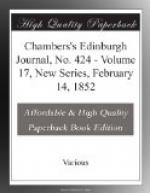Recently, the Newcastle papers, led on by the Chronicle, have been making strenuous efforts to extend the French coal-trade, but such exertions formed no part of the ‘wisdom of our ancestors.’ The number for June 15, 1765, informs us that ’some sinister designs for exporting a very considerable quantity of coals to France and elsewhere, have lately been discovered and prevented.’ Sturdy Britons had then far too much hatred for ‘our natural enemies’ to wish to exchange aught but hostilities with them. About the same time, we learn that ‘clubs of young gentlemen of fortune’ had come to the magnanimous resolve, ’to toast no lady who has so much inconsideration as to lavish her money away in French fopperies, to the detriment of her own country.’
The style of advertising then in vogue occasionally gave the paper a somewhat pictorial appearance. Cockfighting was in great force, and the public announcements relative to this barbarous sport were invariably headed by a portraiture of a couple of game-birds facing each other with a most belligerent aspect; while the numerous advertisements of horses ‘stolen or strayed,’ were embellished by a representation of the supposed thief, mounted on the missing animal, which was forced into a breakneck pace, while Satan himself, in propria persona, was perched on the crupper, in an excited and triumphant attitude. In the local paragraphs, we note several indicating a strong feeling of animosity between the Scotch and English borderers. We observe also that the Newcastle dogs—to this day a very numerous fraternity—were at times quite unmanageable, and caused, either by their ravenous exploits, or their downright madness, no small uneasiness to the town and neighbourhood. It must be confessed, that in its marriage-notices, at least, the Chronicle was far superior to anything that journalism can now exhibit in Newcastle or in Great Britain. These interesting announcements must have intensely delighted our grandmothers; and, we fear, have frequently tempted our grandsires into a somewhat precipitate plunge into the gulf of matrimony. Instead of barely specifying, as papers now do, that Mr Smith married Miss Brown, the Chronicle uniformly tantalised its bachelor readers with an account of the personal, mental, and, if such there were, metallic charms of the bride; so that how any single gentleman, in the teeth of such notifications, could retain his condition for long, is really marvellous. Most




